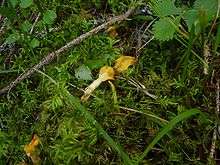Spathularia
Spathularia is a genus of fungi in the family Cudoniaceae. Species in the genus are found in coniferous forests around the bases of conifers or near rotting logs.
| Spathularia | |
|---|---|
 | |
| Spathularia flavida | |
| Scientific classification | |
| Kingdom: | |
| Division: | |
| Class: | |
| Order: | |
| Family: | |
| Genus: | Spathularia Pers. (1794) |
| Type species | |
| Spathularia flavida Pers. (1797) | |
| Species | |
|
Spathularia flavida | |
| Synonyms[1] | |
Spathularia flavida
Spathularia flavida, like other members of the family Cudoniaceae, is distinguished by having long, needle-like spores. A common name for Spathularia flavida is yellow Earth tongue. The spores are tightly packed side by side in the asci. The fruit body of S. flavida is a light yellowish-brown color and rarely of a brown color. The stipe grows to about eight centimeters in length and one centimeter in girth, and the flattened head grows on the sides of the stipe. It has a fairly smooth head and stipe, and has no odor.[2] Several specimens were recovered in two expeditions to Sichuan Province, China, in 1997 and 1998.[3] The habitat ranges across continents, mainly the coniferous forests of the United States and Europe. It can be found near the bases of coniferous trees in ring shaped clusters; however, sightings are rare and infrequent.[4]
Spathularia neesii
Spathularia neesii is similar to S. flavida' it is roughly the same size and shape, up to 8 centimeters in length and 1 centimeter in stipe width. Their colors are also similar–both are of a pale yellow but S. neesii tends to have a pale brown, tan, color, unlike the yellow of S. flavida. When dried both specimens look identical and is almost impossible to tell a difference with the naked eye. The distinguishing feature of S. neesii is the spores that measure 60 to 80 mic. long, around 20 mic. longer than that of S. flavida.[5]
References
- "Synonymy: Spathularia Pers". Species Fungorum. CAB International. Retrieved 2014-07-11.
- Kuo M (January 2005). "Spathularia flavida". Retrieved 2014-07-11.
- Wang Z, Binder M, Hibbett DS (2002). "A new species of Cudonia based on morphological and molecular data" (PDF). Mycologia. 94 (2): 641–50. doi:10.2307/3761715.
- Mosquin, Daniel (August 31, 2009). "Spathularia flavida". Retrieved October 6, 2011.
- Lloyd, Curtis (1919). Mycological writings of C. G. Lloyd. 5. Cincinnati Ohio, USA. pp. 13–14. Retrieved October 12, 2011.